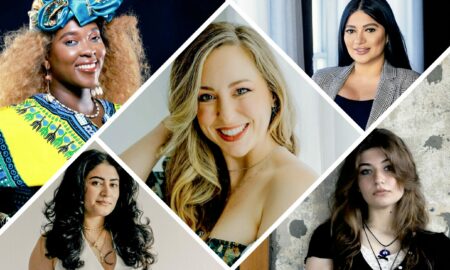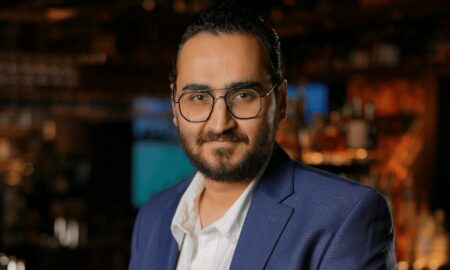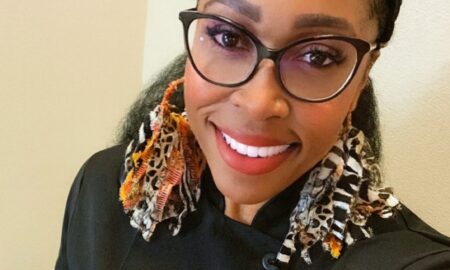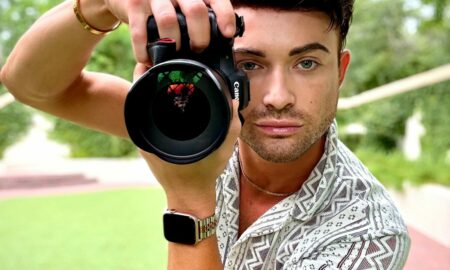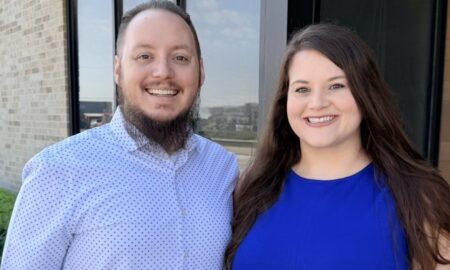

Today we’d like to introduce you to Sarah-Jayne Smith, Ahshia Berry.
Sarah-Jayne and Ahshia, let’s start with your story. We’d love to hear how you got started and how the journey has been so far.
Sarah-Jayne Smith: I founded Magpies & Peacocks in 2011 with help from a small but mighty set of friends. I had a long career in design tucked under my belt and had learned a lot about Houston as a city since my move here from London in 1998. Interior design had given me access to the homes and lifestyles of many Houstonians, and it had been quite a culture shift from my life in England! Environmental awareness was clearly an area in need of improvement here, but oddly what stuck out in my mind was particularly how people cleaned out their closets and how wasteful we had all become.
I had recently lost my mother and sister to cancer and was brutally aware of the problems of getting rid of things that had sentimental value. We all have stories attached to ‘things’ and as our lives evolve we squirrel away this stockpile of stuff we attach to those memories. It seemed like there needed to be a much better route for that stuff, one that would honor those processions rather than have them sit collecting dust, getting bagged up with the goodwill pile or worse ending up in the trash.
Meanwhile in the retail industry, fast fashion was rampantly taking over and cheap apparel was creating a ‘disposable’ attitude to clothing. Every day seemed like a too good to be missed Sale and we were fast becoming the unwitting victims of a shift in the industry. As a nation were ‘consuming’ 400% more clothing that we had just a decade earlier and we all had bulging closets with items still with tags on sitting alongside items we just ‘couldn’t’ get rid of. And things were about to change for the worse!
At that time there were inspirational organizations starting to do good work in the recycling and up-cycling sector in Europe but not much at all creating real impact at community level this side of the pond. The more research I did the further imbedded I got into the subject, and it was clear if M&Ps was going to be able to effect a change in people’s behavior, and tackle a problem of such magnitude it was going to have to be done on a large scale (and it was going to be a bumpy ride!). As a team we decided to test the market so arranged our first ‘Closet Deposit’ in the winter of 2011. We asked around 50 women to clean out their closets, not just of the worn out stuff that they would easily give up, but other items – jewelry, ex -husband gifts, inherited pieces, and those pieces with the tags still on! The good stuff, even pieces that maybe they didn’t feel right donating to the thrift store. This was an exercise in connecting people with their things and trying to find that different route toward a solution. We collected over 1500 pieces that night and it paved the way for the next six years.
By 2012, Fast Fashion was about to have its bubble burst as a large factory in Bangladesh collapsed killing over 1100 poorly paid garment workers that had been trapped inside squalid and unsafe working conditions. They had been working on contracts for some of the largest US brands and clearly without the regard, safety or protection of those big names. It served as a public shaming and made telling the story even more important for us. The fashion industry by this point had become the 2nd largest polluter of the planet second to oil, was clearly spiraling out of control ethically and as we delved deeper into our research was responsible for some of the worst environmental violations. Adding to that only 15% of what we were getting rid of was actually being recycled or sold to developing countries (yes sold) leaving a staggering 85% going to landfill! We needed not only to tackle how we were disposing of our clothing but we seriously needed to check our shopping habits.
By the end of 2012, I had met Ahshia Berry through a PR company that we were using, and she had hopped on board to exclusively be the marketing and PR driver for the organization. We were really ramping up how we were doing business and trying to win the hearts and minds of the city… and this really marked the beginning of what the non-profit looks like today. Together we have been able to achieve so much, we are both very driven and have very different skill sets so we can be a force to be reckoned with (in a good way of course!).
Overall, has it been relatively smooth? If not, what were some of the struggles along the way?
It has not been the easiest of journeys building Magpies & Peacocks, especially getting funding! We are an unusual non-profit business model to say the least and there are still not many people who know about the problems with the fashion industry let alone the scale of the environmental impact. But Houston is a great location for us, we are involved with many many grassroots organizations around town and are very community driven. There is still so much work to be done but we feel like every product we up-cycle, every designer we work with and every new donor we pick up takes us one step closer.
Magpies & Peacocks – what should we know? What do you guys do best? What sets you apart from the competition?
Magpies & Peacocks (501c3) is a non-profit design house dedicated to diverting post-consumer textiles (PCT) from landfill, educating on responsible consumption, sustainability and the circular economy within the art and design industries. We collect donated clothing, textiles and accessories, and through collaboration find creative solutions for its reuse, including creating up-cycled products to help fund our programs and support community development.
We have worked in the Houston area now for over six years. We have collected over 125,000 lbs. of post-consumer and industry scrap textiles from residents and local businesses, and this year we were invited to work with the NFL Environmental Department for Super Bowl 51, partnering in their most successful material recovery in the history of the game.
With all the raw material we have diverted from landfill, we have worked with hundreds of artists, designers, students and educators to ensure ‘used’ fabric is included in curriculum, we have created thousands of up-cycled products, hosted workshops and community talks, and built out a 6000 sq. ft. resource library and warehouse for the art and design community.
Magpies & Peacocks has had great support from the arts community, the interior and professional organization industries and design schools, so are excited to be building on those connections. In addition, this year we had an up-cycled collection, Re:ne(w) by René Garza for Magpies & Peacocks, show at London Fashion Week, were featured in British Vogue and a TEDTalk, filmed by NBC, selected by the BBVA Momentum program as one of their 20 Social Enterprises, and received an environmental innovation grant from Patagonia – so all in all it has been a pretty good year!
What is “success” or “successful” for you?
As a Social Enterprise and a non-profit the definition of success is measurable impact, so it is a driving force deep at the core of the organization. We also have a deep rooted company culture to give back to the community – so pretty much everything we do has to both create quantifiable impact and benefit our city! As team we are passionate animal lovers so we also do everything we can to support our friends in the rescue trenches! On a personal level we have always viewed the organization as a vehicle for change, and one that could be replicable in any city, in any state, by any 10 people – and if we can do it here, we can do it anywhere! We have big plans and even bigger goals to scale up what we do, so be sure to check back in with us soon – and if you would like to donate or volunteer we’d love to hear from you!
Five Fast Facts about the Fashion Industry:
1. The fashion industry is the world’s 2nd largest polluter. Second to the oil industry.
2. We consume a staggering 80 billion pieces of clothing each year. This is up 400% from two decades ago.
3. We currently only recycle 15% of donated clothing.
85% ends up in landfills or flooding markets in developing countries killing the local economies.
4. One-in-six people work in the global fashion industry.
A majority are women earning less than $3 per day in deplorable conditions. Many are children.
5. It takes 715 gallons of water to make just one t-shirt – that’s about the amount of water an average person drinks over two and a half years.
Pricing:
- Products range from $20 – $2500
Contact Info:
- Address: Magpies & Peacocks
908 Live Oak
Houston TX 77003 - Website: http://magpiesandpeacocks.org
- Email: info@magpiesandpeacocks.org
- Instagram: https://www.instagram.com/magpiespeacocks/
- Facebook: https://www.facebook.com/MagpiesAndPeacocks
- Twitter: https://twitter.com/MagpiesPeacocks








Image Credit:
Headshot: Ahshia Berry and Sarah-Jayne Smith, Photography by Cody Bess
Magpies & Peacocks product designers shown: Jan Forrester, Carlsbad Oster, Sarah-Jayne Smith, Rae Day, Heather Wobbe, René Garza. Photography by Magpies & Peacocks and René Garza
Getting in touch: VoyageHouston is built on recommendations from the community; it’s how we uncover hidden gems, so if you know someone who deserves recognition please let us know here.












